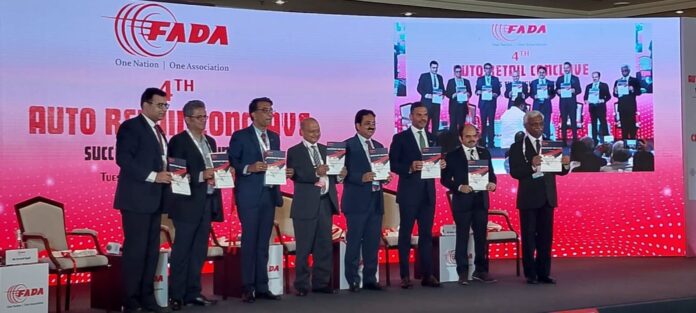
The Federation of Automobile Dealers Associations (FADA) hosted the fourth edition of the Auto Retail Conclave recently on the theme of ‘Success Through Synergy’. The conclave witnessed the presence of automobile industry stalwarts from Indian and global automobile Manufacturers, along with over 300 dealer members from across the nation.
Under the leadership of FADA President Mr. Manish Raj Singhania, the conclave witnessed the launch of the much-awaited “Model Dealer Agreement (MDA).” The new draft agreement visions to offer level playing field for OEMs and Dealer partners, in addition to further extending the responsibilities towards the end customers. FADA research studying over 100 global and Indian OEM- Dealer Contracts before coming up with the draft and visions enactment of the Auto Dealers Protection and proposes a Model Dealer Agreement to keep the agreement balanced.
The Conclave was inaugurated in the presence of our distinguished Guests, Mr. Vinod Aggarwal, President Elect, SIAM, Mr. Sunjay J Kapur, President ACMA, Mr. Arvind Kapil, Country Head-Retail Assets, HDFC Bank, and Mr. Amar Jatin Sheth, Treasurer FADA.
Hon’ble Guest, Mr. Vinod Aggarwal, President Elect, SIAM, acknowledged the significant contribution made by the dealer community in the auto industry since their existence, said, the dealer community has been the extended face of the brand for the customer. It is our privilege to work closely FADA and complement each other’s assets. Since the Indian Auto industry faced a lot of ups and downs caused due to inflation, less supply and high fuel prices we are confident to witness the recovery of the industry. During last year, the growth has been particularly observed in domestic sales of vehicles. Thus, we are yet to reach the peak level of 2018 – 2019 but we have already reached in the pre pandemic level in most of the automotive sectors.
Apart from this we are looking forward to step ahead for a new phase of growth in the industry, the recovery of the industry has been in the hands of auto OEMs and automobile dealers, who further plays an integral part.
Hon’ble Guest, Mr. Sunjay J Kapur, President ACMA,said, component is an important part of the automobile ecosystem and we are committed to offer our OEM dealer partner will the best ease of supply of accessories. We have seen strong sales over the past few months and anticipate breaking non-covid global records. We have also had erratic supply and logistical difficulties, which have led to problems with a scarcity of semiconductors. Recognizing the impressive resiliency displayed in the face of difficulties, the dealership sector is anticipated to transform into the mobility sector. Globally, the EV industry has had rapid expansion, and the use of digital platforms is also well-liked. Given that the pandemic has forced us to operate in a hybrid manner, it is practical to support WFH to facilitate improved performance. Public awareness and road safety initiatives should both be emphasized.
Welcoming all the members from the entire automotive ecosystem at the Auto Retail Conclave,Mr. Manish Raj Singhania said,“Dealerships have been a responsible and credibly integral part of the automobile industry ever since its existence. On behalf of the dealer community, I wish to assure our OEM partners & customers that as a community we are entrusted to serve each of them to the best of our abilities, and the industry will strive to offer all customers a unique buying and ownership experience every time they visit a dealership. This year, we are thus extremely delighted to present two of our very intelligent verticals: FADA GenX, a vertical for the future generation of auto dealers, and Women in FADA, which encourages female entrepreneurs who run any department of dealerships to join FADA.
The launch of “Model Dealer Agreement (MDA)“ marks a significant turning point for the community. The model dealer agreement will provide a level playing field to both the dealer partner and OEMs in addition to giving them a significant amount of confidence towards a long-term association and an exciting future. Since the auto dealership industry requires significant capital investment and it takes dealers 4-5 years to break even. It is imperative that our agreement safeguards and create a balance between OEMs and Dealers since they are both crucial components of a single ecosystem. In addition to boosting dealer and OEM confidence, a stronger dealer agreement would instils a sense of increased accountability for both parties towards the end users. A bigger contribution to the growth of the economy in the form of capital investments & job creation would come from the amount of confidence that MDA instils in the sector. Without relocating them, the auto dealer community currently employs more than 4.5 lakh people directly and indirectly; improved business confidence will boost this number.
The Model Dealer Agreement is a document that FADA strongly advises OEMs to consider since it is intended to maintain all parties equally responsible for their obligations and to advance the auto industry and the consumer ownership experience. In order to protect Indian car industry & customers from any uncertain & abrupt exits from the country or business, we also require the Indian government to introduce Auto Dealer Protection Act.”
Mr. Singhania further added; India sells around 2 crore vehicles annually, with the 2W market accounting for over 70% of sales, totaling 1.4 crore vehicles. These cars are subject to a 29% effective tax rate that is made up of 28% GST + 1% cess. Indians desire to own a car, but the 2W product is more of a need than a pleasure. We look forward to advocating for a reduction in the GST rate from the current effective rate of 28% to 18% to all the states and the GST Council members. As a result, all parties involved will gain from the rise in car sales. Therefore, 2-Wheeler industry in India, which is in decline for several reasons, including rising product prices, high fuel prices, rising cost of ownership, etc., will benefit from this action.
The conclave witnessed a series of sessions with industry abled leadership sharing their views & vision for the sector & its challenges. The key Power Panel discussion were on Perfecting Supply & Demand followed by Dealer Satisfaction Study – Hits & Misses.









